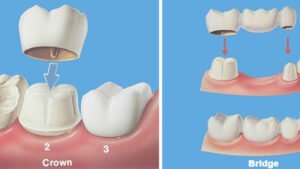- Mon-Sat :9:30am-1:00pm | 4:30pm-8:00pm.
- +91 9443092162
- thebanudentalclinic@gmail.com
Best Dental Clinics in Kumbakonam
01/08/2025Pain-Free Cosmetic Dentistry
01/08/2025How Long Does a Dental Crown Last?
Dental crowns are one of the most common restorative treatments used to repair damaged or weakened teeth. If you’ve recently received a crown or are considering one, a common question is: how long does a dental crown last? The answer depends on several factors, including the material of the crown, how well it is maintained, and your overall oral hygiene habits. In this blog, we’ll explore the average lifespan of dental crowns, what affects their durability, and how you can make them last longer.
Tooth crown treatment in kumbakonam
Average Lifespan of a Dental Crown
On average, a dental crown can last anywhere between 10 to 15 years. However, many patients find that their crowns last even longer—up to 20 or 25 years—with proper care. The longevity largely depends on the material used. Metal crowns, for example, are known for their durability and can last several decades. Porcelain-fused-to-metal crowns offer a blend of aesthetics and strength and generally last around 10 to 15 years. All-ceramic or all-porcelain crowns are more natural in appearance and suitable for front teeth but may wear down a bit faster than metal-based alternatives.
What Factors Affect Crown Longevity?
There are several factors that determine how long a dental crown will last in your mouth. One of the most important is the material. Metal crowns, while not always aesthetically pleasing, are extremely durable. Porcelain crowns look more natural but may be more susceptible to chipping, especially if you grind your teeth or consume very hard foods regularly.
The location of the crown also plays a role. Crowns placed on molars endure more pressure from chewing and grinding, which can reduce their lifespan compared to those placed on front teeth. Your personal habits are just as important. If you have a habit of biting nails, chewing ice, or using your teeth to open packages, you risk damaging the crown prematurely.
Oral hygiene is another major factor. Brushing and flossing daily, along with regular dental checkups, will keep the area around the crown healthy and prevent decay or gum disease, which could compromise the crown’s foundation.
Can a Crown Be Repaired?
In some cases, minor damage to a crown can be repaired, especially if it’s made of ceramic or porcelain. Your dentist may be able to smooth out small chips or apply a resin for cosmetic repairs. However, if the crown is severely damaged or the underlying tooth structure is compromised, replacing the crown may be the only viable option.
Tips to Extend the Life of Your Dental Crown
Taking a few simple steps can significantly increase the lifespan of your dental crown. Maintaining excellent oral hygiene is key. Brush twice a day using fluoride toothpaste and floss at least once a day to remove plaque from around the crown. Avoid chewing hard foods, ice, or non-food objects. If you grind your teeth at night, consider using a night guard to protect your crown and natural teeth from excessive pressure. Make it a habit to visit your dentist at least twice a year for checkups and cleanings, as they can catch potential problems before they become serious.
Where to Get Long-Lasting Tooth Crown Treatment in Kumbakonam?
If you’re considering dental crown treatment or need to replace an old crown, it’s important to choose a clinic that prioritizes quality materials, precision techniques, and personalized care. At Banu Multispeciality, we specialize in providing durable and aesthetically pleasing dental crowns that are designed to last. Our team uses the latest dental technology and high-quality materials to ensure that each crown fits perfectly and functions naturally. Whether you need a crown after a root canal, for cosmetic reasons, or due to tooth damage, we offer comprehensive care tailored to your needs.
Conclusion
While the average lifespan of a dental crown is around 10 to 15 years, many factors influence how long it will actually last. With the right materials, good dental habits, and regular checkups, your crown can serve you well for many years. If you’re looking for reliable tooth crown treatment in Kumbakonam, trust the expertise and commitment of Banu Multispeciality to provide the best care for your smile.

